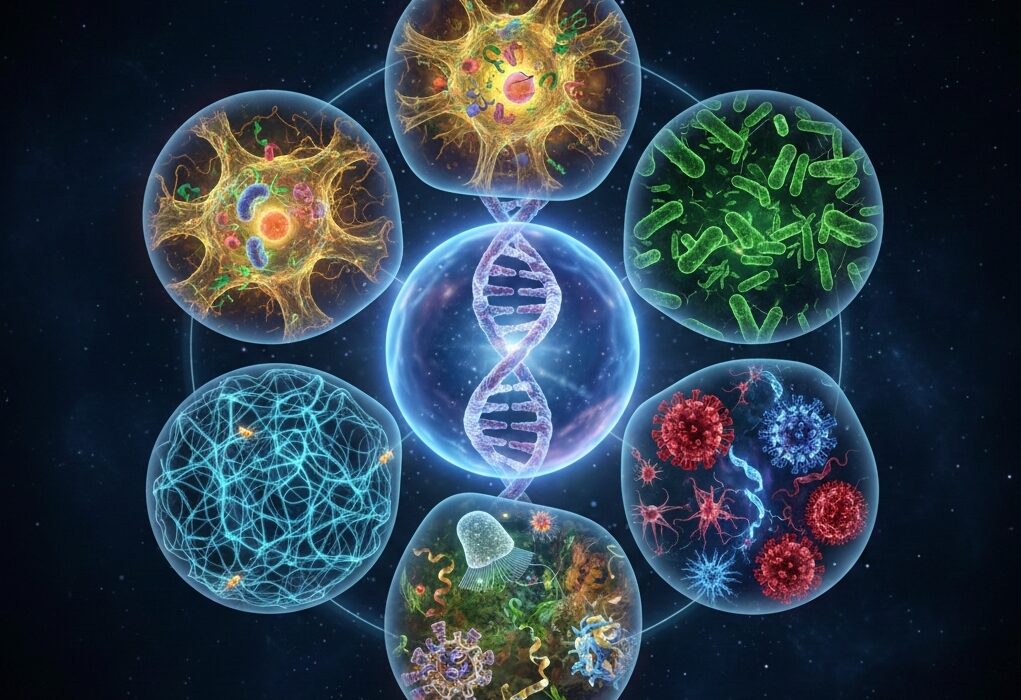The human body is a marvel of biology, a living orchestra of cells, tissues, and organs working in perfect harmony. Among its most extraordinary players is the immune system—a vast, complex defense network that guards us against disease, repairs damage, and even remembers past enemies to fight them off more efficiently in the future. Without it, the smallest infection could be deadly, yet with it, we thrive, adapt, and survive in a world teeming with microbes.
The immune system is not just a shield; it’s a story of resilience, intelligence, and constant evolution. In this article, we will explore 20 amazing facts about the human immune system—facts that are scientifically accurate but also emotionally engaging, showing just how remarkable this hidden army inside us truly is.
1. Your Immune System Is Everywhere in Your Body
When people think of the immune system, they often imagine white blood cells fighting off germs. But the truth is, the immune system is everywhere—woven through your skin, blood, bone marrow, lymph nodes, spleen, tonsils, and even your gut. Every organ and tissue in your body is under the watchful eye of immune defenders, ready to respond at the first sign of danger. It’s not confined to one place; it’s an entire network, like an invisible web guarding every corner of your body.
2. It’s Older Than You Think—Even Ancient Organisms Have It
The immune system is not a modern development of evolution. In fact, it is ancient. Even simple organisms like sponges and insects have primitive immune systems. While humans and other vertebrates developed an adaptive immune system capable of remembering past infections, the basic defense mechanisms date back hundreds of millions of years. Every sneeze, every healed wound is part of an evolutionary story billions of years in the making.
3. Your Skin Is Your First Line of Defense
The immune system doesn’t begin deep inside your body—it begins with your skin. This amazing organ acts as a physical barrier, keeping harmful bacteria, viruses, and fungi from entering. But the skin is more than a wall; it produces antimicrobial peptides and hosts friendly microbes that outcompete harmful ones. Even your sweat helps defend you by creating an environment hostile to many pathogens. Your skin is a living fortress.
4. White Blood Cells Are the Soldiers of Immunity
White blood cells, also called leukocytes, are the immune system’s foot soldiers. They patrol your bloodstream and tissues, seeking out intruders. Different types have specialized roles: neutrophils are the first responders, lymphocytes remember past infections, macrophages engulf invaders, and natural killer cells destroy infected or cancerous cells. Together, they form a coordinated army that never sleeps.
5. The Immune System Has Two Main Branches
Your immune system isn’t just one mechanism—it has two major arms: the innate immune system and the adaptive immune system.
- The innate immune system is your body’s fast, non-specific defense. It reacts instantly to threats but doesn’t remember them.
- The adaptive immune system, on the other hand, learns from experience. Once it encounters a pathogen, it develops a memory, ensuring a faster, stronger response if that pathogen returns.
This combination of instant protection and long-term memory makes the immune system incredibly powerful.
6. Your Immune System Remembers Enemies for Decades
One of the most amazing abilities of the adaptive immune system is immunological memory. After an infection or vaccination, your immune system creates memory cells that can recognize that pathogen for years—or even a lifetime. That’s why people usually only get diseases like measles or chickenpox once. It’s also the principle behind vaccines, which train your immune system to remember threats without making you sick.
7. Your Gut Is Home to 70% of Your Immune Cells
Believe it or not, most of your immune system is concentrated in your gut. The intestines are lined with lymphoid tissue and filled with immune cells that constantly monitor what comes in with food. This makes sense—your gut is the largest entry point for foreign material. Trillions of microbes live there, and your immune system has the challenging task of distinguishing between helpful bacteria and harmful invaders.
8. Fever Is a Weapon, Not a Weakness
When you’re sick and develop a fever, it may feel like your body is betraying you. But in truth, fever is a weapon. By raising your body temperature, your immune system creates an environment that is less favorable for bacteria and viruses to grow. At the same time, higher temperatures speed up immune reactions, helping white blood cells work more effectively. The discomfort of fever is actually a sign that your body is fighting back.
9. Inflammation Is Both a Friend and a Foe
Inflammation is another tool of the immune system. When tissues are injured or infected, blood flow increases, immune cells rush to the scene, and chemical signals call for reinforcements. This is why cuts turn red and swell. In small, controlled doses, inflammation is healing. But chronic inflammation, when the immune system doesn’t turn off properly, can contribute to diseases like arthritis, diabetes, and even cancer.
10. Sleep Is a Powerful Immune Booster
Your immune system works while you sleep. During deep sleep, your body releases cytokines—proteins that help regulate immunity. Studies show that people who don’t get enough sleep are more likely to catch colds and recover more slowly from infections. That groggy feeling after pulling an all-nighter isn’t just fatigue—it’s your immune system warning you that it’s under strain.
11. Stress Weakens Your Immunity
Stress isn’t just a mental burden; it has profound physical effects. Chronic stress floods your body with hormones like cortisol, which suppress immune function. This is why people under prolonged stress often get sick more easily. A healthy immune system doesn’t just need good nutrition—it also needs peace, rest, and balance.
12. Vaccines Are One of the Greatest Immune Achievements
Vaccines are one of humanity’s most powerful tools, and they work by training the immune system. Instead of facing a dangerous pathogen unprepared, vaccines expose the immune system to harmless versions or fragments of the virus or bacteria. This allows the immune system to build memory without the risk of severe illness. Thanks to vaccines, diseases like smallpox have been eradicated, and others like polio and measles are vastly reduced.
13. The Immune System Sometimes Attacks Itself
While the immune system usually protects us, sometimes it goes awry. In autoimmune diseases, the immune system mistakenly identifies the body’s own tissues as enemies. Conditions like type 1 diabetes, multiple sclerosis, and lupus are examples of this misfiring. Scientists are still working to understand why this happens and how to retrain the immune system to distinguish self from non-self.
14. Allergies Are an Overreaction of the Immune System
Sneezing in spring, itchy eyes, or reactions to peanuts are the result of allergies. Allergies occur when the immune system overreacts to harmless substances like pollen or food proteins. It releases chemicals such as histamines that cause inflammation and symptoms. While uncomfortable, allergies reveal just how sensitive and vigilant the immune system can be—even if sometimes it’s too sensitive.
15. Your Immune System Fights Cancer Every Day
Every day, cells in your body make mistakes as they divide. Sometimes these mistakes could lead to cancer. Fortunately, your immune system is constantly on patrol, detecting and destroying abnormal cells before they become dangerous. This natural defense is called immunosurveillance. Modern medicine has harnessed this ability through immunotherapy, a revolutionary cancer treatment that helps the immune system target and destroy tumors more effectively.
16. Exercise Strengthens the Immune System
Moderate physical activity boosts immunity by improving circulation and reducing inflammation. It helps immune cells move more freely throughout the body, making them more effective at fighting infections. However, extreme over-exercising can temporarily suppress immunity, showing that balance is key. A daily walk or jog may be one of the simplest ways to keep your immune system resilient.
17. Your Immune System Evolves with Age
Like the rest of your body, the immune system changes as you age. Infants are born with immature immune systems, relying on antibodies passed from their mothers through the placenta and breast milk. As children grow, their immune systems strengthen with exposure to new microbes. In older adults, however, immunity often weakens, making them more susceptible to infections and less responsive to vaccines.
18. Nutrition Plays a Vital Role in Immunity
Food is more than fuel—it’s medicine for your immune system. Nutrients like vitamin C, vitamin D, zinc, and iron play critical roles in immune function. The gut microbiome, which thrives on fiber and diverse plant foods, also supports immunity. Malnutrition, even in mild forms, weakens defenses, while a balanced diet strengthens them. Your immune system literally reflects what you eat.
19. The Immune System Communicates with the Brain
The immune system doesn’t work in isolation; it talks to your brain. When you’re sick, immune cells release chemicals called cytokines that signal the brain to induce fatigue, fever, or loss of appetite—all strategies to conserve energy and help the body heal. This close relationship between brain and immunity also explains why mental health and physical health are so deeply connected.
20. Your Immune System Is Unique to You
No two immune systems are identical. While humans share the same general components, each person’s immune system is shaped by their genetics, environment, diet, and life experiences. Even identical twins develop differences in their immune responses over time. This individuality explains why some people rarely get sick while others are more vulnerable, and why one person’s allergies may be another’s harmless exposure.
Conclusion
The human immune system is nothing short of extraordinary. It is ancient yet adaptive, invisible yet powerful, automatic yet intelligent. It guards us against countless threats every day, often without us even realizing it. It remembers, it learns, it adapts, and it even repairs us from within.
When we marvel at the immune system, we are not just appreciating biology—we are recognizing the miracle of survival. Each time you recover from a cold, heal a cut, or fight off an infection, it is because of this silent army working tirelessly inside you.
By learning more about the immune system, we not only gain scientific knowledge but also develop a deeper respect for the intricate, hidden guardian that keeps us alive.






